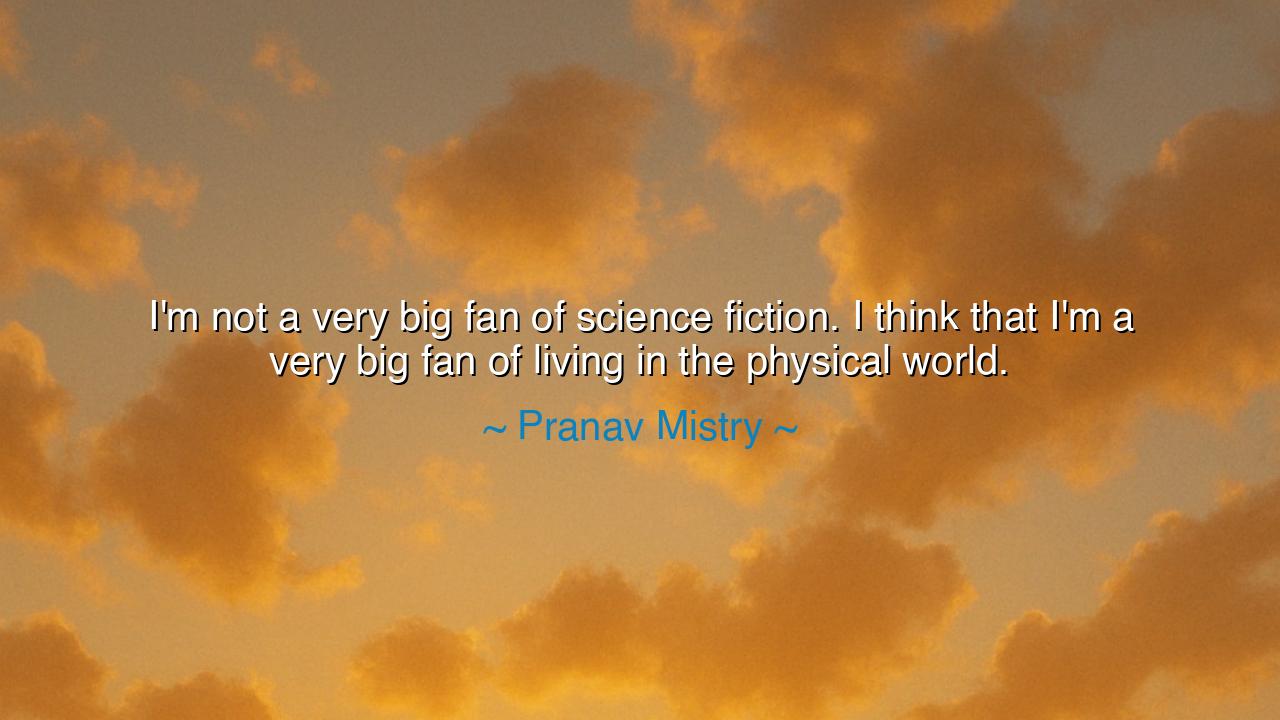
I'm not a very big fan of science fiction. I think that I'm a
I'm not a very big fan of science fiction. I think that I'm a very big fan of living in the physical world.






Hear, O Seekers of Truth, the words of Pranav Mistry, a man whose mind is rooted deeply in the physical world, yet who understands the importance of not losing touch with what is tangible and real. "I'm not a very big fan of science fiction. I think that I'm a very big fan of living in the physical world." In these words, Mistry speaks to a fundamental tension that exists between the imagined worlds of science fiction and the concrete realities of life as we know it. The worlds created in the pages of science fiction offer visions of future technologies, far-off planets, and alternate realities—but Mistry's words remind us of the grounding power of the physical world, a world that is immediate, tangible, and governed by the laws of nature that we must understand and navigate to survive.
Consider, O Seekers, the ancient philosophers who rooted their wisdom in the observation of the natural world. Aristotle, whose works in biology, physics, and ethics laid the foundation for centuries of thought, taught us that true knowledge comes from the empirical—from the study of the world as it is. Socrates, too, urged his followers to seek truth not in abstract theorizing but in the practical world of experience. The ancients did not dismiss the power of imagination, but they understood that to make meaningful progress, one must first ground oneself in the real, the knowable, and the physical—the world that can be touched, tested, and understood through reason and observation.
Mistry’s words echo this ancient call to focus on the concrete aspects of life. While science fiction can certainly inspire creativity and visionary thinking, it can sometimes lead one astray from the immediate challenges and problems of the present world. In our modern age, we have an abundance of futuristic ideas, technological marvels, and dreams of space travel, but Mistry reminds us that it is in the physical world—in technology, engineering, and practical solutions to the challenges we face—that true progress lies. Science fiction, though valuable as a tool for imagination, should never overshadow the need for real-world action.
Consider, O Seekers, the story of Nikola Tesla, whose mind was as imaginative as any great science fiction writer, yet whose work was grounded in the physical world. Tesla imagined the possibilities of wireless communication, free energy, and electric power, and he sought to bring these ideas into the realm of practicality. Unlike the fantastical worlds of science fiction, where ideas may exist without limitations, Tesla’s work was rooted in the physical realities of electricity and engineering. His vision of the future was grounded not in the abstract, but in the application of science to the world as it existed, seeking to improve the lives of everyday people. In his pursuits, Tesla demonstrated that vision and creativity must always be tempered by the constraints and realities of the world we live in.
There is, O Seekers, a deep lesson to be learned here. The imagination—the realm where science fiction resides—is an important part of human growth, but it must not become a substitute for the work that needs to be done in the here and now. We must ask ourselves: What good is a great vision of the future if we are not grounded in the practical solutions that can create that future? Mistry's words are a reminder to focus on the present moment, to understand and improve the real world through science, engineering, and innovation that are born from the immediate and physical challenges around us. Technology must serve the present, not distract us from it.
And so, O Seekers, we are called to find a balance—to dream of the future, to imagine new worlds and new possibilities, but also to turn our attention to the real world, to the problems we can solve today. Mistry’s insight reminds us that the physical world is not something to be overlooked for the sake of abstract fantasies. It is the world we live in, the world that gives us the foundation upon which we build our dreams. If we are to move forward, we must ground our innovations in reality, understand the practical needs of the people around us, and solve the challenges that face us here and now.
So go forth, O Seekers, with the understanding that the physical world is not just something we must endure, but something we must engage with, understand, and improve. Imagination and science fiction have their place, but never forget that the true power to change the world comes from the action we take in the world we inhabit. Let your dreams inspire you, but let your feet remain firmly planted in the reality of the physical world, where solutions can be created, problems solved, and a better future built. The future is shaped not only by the imagination but by the work we do today in the world as it truly is.






AAdministratorAdministrator
Welcome, honored guests. Please leave a comment, we will respond soon